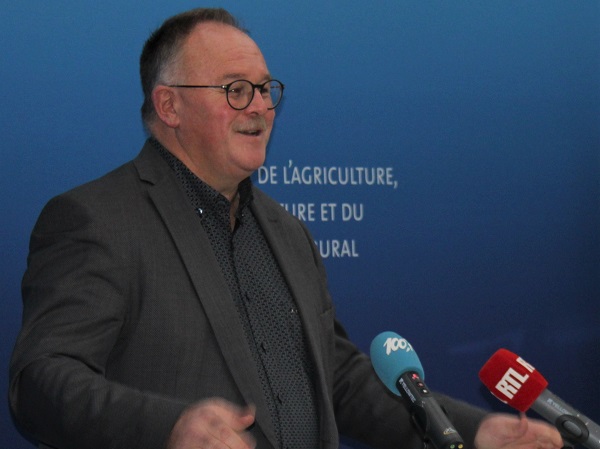 Romain Schneider, Luxembourg's Minister of Agriculture, Viticulture and Rural Development;
Credit: MA
Romain Schneider, Luxembourg's Minister of Agriculture, Viticulture and Rural Development;
Credit: MA
At a press conference on Tuesday 8 December 2020, Luxembourg's Minister for Agriculture, Viticulture and Rural Development, Romain Schneider, presented the accounts for the country's agriculture and viticulture for 2019, as well as the forecasts for the 2020 financial year based on the agricultural test farm network.
For 2019, 587 farms were evaluated in the context of the test farm network. These figures were extrapolated to the approximately 1,300 full- and part-time businesses in the Grand Duchy. The results, presented on the basis of the "ordinary result" (adjusted profit), can be summarised as follows:
- the average ordinary result for the 2019 financial year fell by 3.5% compared to the previous year, but at €60,200 per establishment remained above the five-year average ( €47,700 per establishment). The Rural Economy Department forecasted an ordinary result of €59,300 per company for 2020.
- the agricultural income per unpaid worker averaged around €39,000 in 2019 and 2020 on this basis.
The result was primarily influenced by good producer prices and a stable market situation in the dairy industry that has persisted since 2017. The average result was significantly influenced by the situation in the dairy industry, since this production is the mainstay of Luxembourg agriculture: 35% of agricultural companies are represented in the sector of specialised dairy farms; these companies generate 60% of the total theoretical production value of Luxembourg agriculture.
In this context, Minister Romain Schneider welcomed the fact that the dairy farms, as well as mixed companies, managed to recover from the crisis following the abolition of milk quotas in 2015.
On the other hand, low prices in the pig meat sector in 2019 proved worrying. Last year, pig farmers were able to achieve an above-average result due to slaughter prices in the EU. From the second quarter of 2020, however, under the influence of the temporary closure of large slaughterhouses due to the coronavirus pandemic as well as the outbreak of African swine fever in Germany, a trend reversal began with high pressure on pig meat prices. Pig farmers currently have to be prepared for a low price phase of -30% compared to the previous year 2019/20.
Similarly, full-time cattle rearing and beef fattening farms only earned an ordinary result averaging €21,200 per company in 2019. The situation is primarily structural due to very low sales and high infrastructure costs.
Also worrying was the feed supply on farms. Summer 2020 was the third summer in a row to be characterised by high temperatures and drought. Due to the depleted feed reserves, a significantly higher demand (up 30%) for feed imports was forecast for 2020. This problem will also have an impact on the 2021 marketing year with an increase in feed purchases.
The result is therefore subject to extremely high fluctuations depending on the operational orientation. With regard to fluctuations in individual sectors, particularly in the pork and beef industries, Minister Romain Schneider emphasised that he was in dialogue witht he players concerned and was looking for constructive solutions. He praised the fact that agriculture was able to continue its activities despite COVID-19 restrictions and losses (depending on the specific industry). With the €5 million COVID-19 economic recovery programme for agriculture, which is based on the three components "consolidate - promote - innovate", the authorities are attempting to react to the economic situation. The Agriculture Minister added that the systemic relevance of agriculture and the importance of farmers in their role as food producers has been shown again to many consumers and it is now important to expand this trend in the medium and long term.
In this sense, Minister Romain Schneider highlighted the promotion of local production and new outlets as one of the government's major priorities. He explained: “The aim of the Agricultural Act is to improve the competitiveness of Luxembourg's farms and to promote sustainable management. In this context, there is a particular focus on processing and direct marketing companies: they are promoted with higher upper limits for investments and given priority in the selection process. At the demand level, we have responded with pilot projects in the field of communal catering, for example as part of the National Organic Action Plan. Furthermore, the government is planning specific measures to support startups and, above all, more new forms of cooperation between producers and consumers in the future. All these measures are part of 'Landwirtschaft+', which is based on the three pillars - ecological, economic and social - and is characterised in its entirety by sustainability, quality and diversity".








